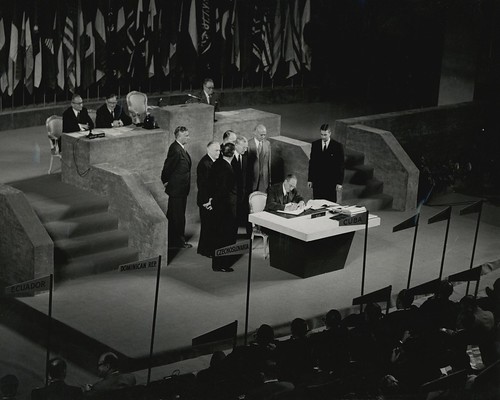
NEW YORK – Japanese Prime Minister Shinzo Abe’s current visit to the United States [visit of February 21-24 2013, the editors] provides an ideal opportunity to reinvigorate the long-standing US-Japan bilateral alliance in the face of an increasingly aggressive China and persistent tensions on the Korean Peninsula.
For a half-century, the US-Japan alliance has been a cornerstone of Asian and global peace, security, and stability – and Japan has been an outstanding global citizen. Japan developed the economic-growth model that other Asian countries later emulated so successfully; actively contributed to global economic development; participated in the United Nations and other multilateral institutions (including paying a disproportionately high percentage of UN costs); and has helped to set a global standard for environmental protection and sustainable development.
As Abe arrives in Washington, DC, Japan and the US are both facing significant internal and external challenges, including rising tensions in Asia. In recent months, Chinese aircraft have repeatedly violated Japanese airspace over the East China Sea, and a Chinese naval vessel locked its weapons-targeting radar on a Japanese destroyer and helicopter.
Likewise, a Chinese military intelligence unit in Shanghai has reportedly hacked – and stolen from – a multitude of US businesses. And North Korea conducted its third nuclear test earlier this month, sending shock waves through the region.
Tackling these challenges will require strong US-Japanese cooperation. But, to enhance the alliance’s impact, both countries must first focus on reinvigorating their own societies and economies. For the US, that requires overcoming a political culture characterized by polarization and crisis in order to develop effective policies aimed at boosting economic competitiveness.
In some ways, Japan’s domestic challenges are even more daunting, given that its political system has produced six prime ministers in as many years, none of whom managed to address effectively Japan’s stagnant economy, decade-long deflation, and shrinking workforce. Japan should move to join the Trans-Pacific Partnership negotiations – aimed at creating a free-trade zone in the Asia-Pacific region – which could help to open up Japan’s overprotected and under-competitive economy, just as accession to the World Trade Organization did for China.
To stem the contraction of its workforce, Japan should launch a major initiative to enhance female employment – and women’s role at all levels of the economy and society. By implementing measures to improve citizens’ proficiency in English and promoting study abroad, Japan’s leaders can tackle the rising insularity, cultural isolation, and inadequate foreign-language skills that are stifling its social and economic development.
Beyond strengthening the economy and bolstering its partnership with the US, Japan must address the enduring suspicions of countries that were brutalized by Japan’s occupation before and during World War II. Although previous Japanese governments have issued apologies for the country’s past behavior, Japan, unlike Germany, has not fully faced its history.
During his election campaign, Abe, a self-declared nationalist, expressed a desire to revise Japan’s1995 apology for its occupation and war record. But he did so while visiting – and voicing his wish to return to – Tokyo’s Yasukuni Shrine, a nationalist pilgrimage site that commemorates, among others, 14 Class A and more than 1,000 Class B and C war criminals.
With Japan’s security in jeopardy, its leaders can no longer afford to be vague about the country’s past. Rather, Abe should reaffirm the country’s 1995 statement; apologize again, even more firmly; and revise or close the Yūshūkan military and war museum at Yasukuni, which glorifies Japan’s militarist past while ignoring its concomitant atrocities. Japan should also reach out to South Korea, America’s other ally in the region, and demonstrate greater flexibility in an effort to resolve the two countries’ long-standing maritime border dispute.
The US and Japan must make clear that China’s provocative behavior in the East China Sea over the last six months is unacceptable, while highlighting China’s obligation to help to rein in North Korea’s nuclear program. If this demonstration of shared values and resolve does not alter China’s behavior, a wider conversation would inevitably begin in Japan about the potential revision of Article 9 of the 1947 Constitution, which essentially denies Japan the ability to maintain armed forces like most other “normal” countries.
This week, US President Barack Obama and Abe should reinvigorate the bilateral alliance, reaffirming the principles on which it is based and committing to ever-closer military and strategic collaboration. If the two countries work to tackle problems in their own societies, and to strengthen the alliance that binds them, the partnership could be as significant in the future as it has ever been in the past.
Copyright Project Syndicate
For additional reading on this topic please see:
Japan-US Relations: Issues for Congress
Japanese Politics: “Season Three”
For more information on issues and events that shape our world please visit the ISN’s featured editorial content and Security Watch.

